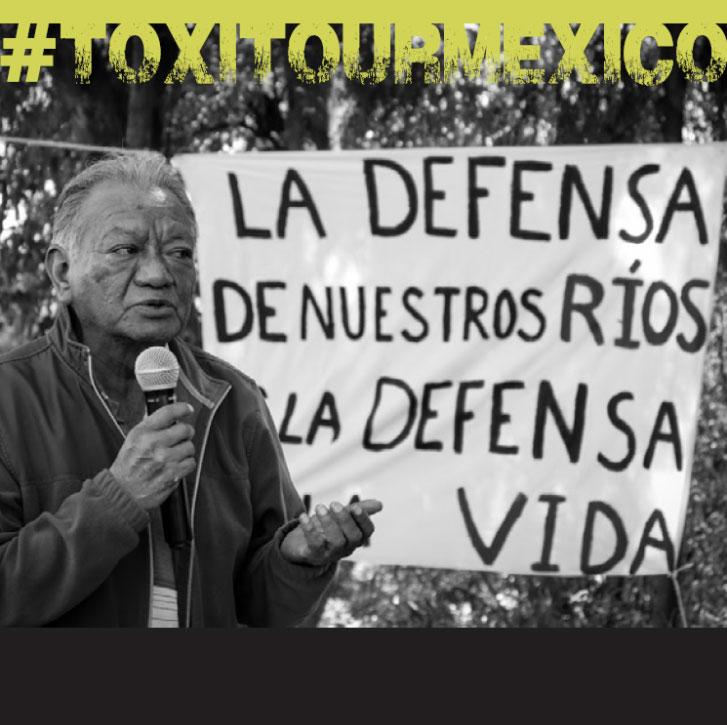
Transnational Corporations and Free Trade in Mexico
Caravan on the Social and Environmental Impacts
This report presents the main results of the “Caravan on the social and environmental impacts of transnational corporations and free trade in Mexico” (#ToxiTourMexico), which took place in December 2019 with the participation of fift y organizations of affected communities in Mexico, members of the European Parliament and the Parliament of the Basque Country, a senator from the State of Minnesota, and scientists and observers from organizations in Germany, Argentina, Ecuador, the United States, France, Catalonia, Mexico, the Basque Country and the Netherlands. Members of the European Network of Corporate Observatories (ENCO) also contributed.
 See more about the Virtual Expo on the Caravan
See more about the Virtual Expo on the Caravan
This report examines how, over the last 30 years, Mexico has become one of the main industrial paradises on the planet, meaning one of the most advanced laboratories for free trade and deregulation. The diversion of power has intensified and become more sophisticated premised on the need to attract investment at all costs for “development” and job creation, under trade agreements such as the North American Free Trade Agreement (NAFTA) or the EU-Mexico Free Trade Agreement. A regime has been imposed, in which the law allows environmental, social and labour self-regulation by transnational corporations (TNCs). Much of Mexico’s territory has been subjected to the development of dense, interconnected industrial corridors, where high-risk industries, extensive agribusiness and extractive industries have proliferated. These sites are located alongside towns and cities with no monitoring of their impact on the health of local people. They have become what V. M. Toledo, Mexico’s former Minister of the Environment, has described as “environmental hells”.
The report builds on the results of the “Caravan on the social and environmental impacts of transnational corporations and free trade in Mexico” (#ToxiTourMexico), an initiative taken forward by Mexican civil society organisations which were among the co-convenors of the Mexico Chapter of the Permanent Peoples Tribunal, and TNI’s Corporate Power Team. Members of the European Parliament and the Parliament of the Basque Country, a senator from the State of Minnesota, and activists and scientists from Europe, the United States and South America participated in the tour. The Caravan travelled more than 2,500 km in December 2019, engaging directly with near 50 organizations of affected peoples in six regions of Mexico.
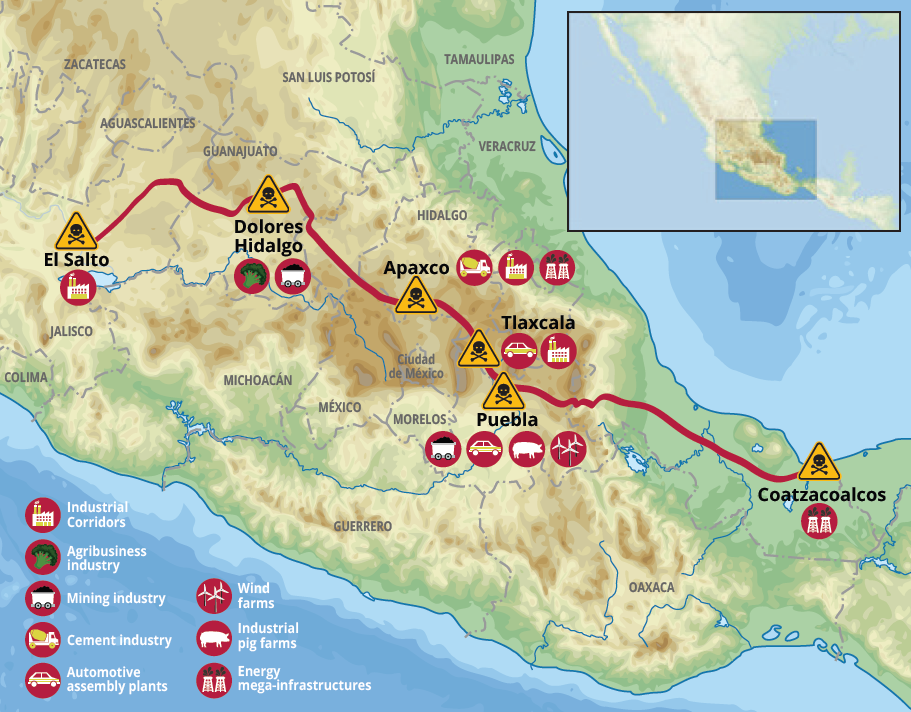
The international observers were able to see for themselves a small proportion of the real social and environmental devastation caused by neoliberalism in this country. They saw evidence of the extent to which the most industrialized regions of the country are characterized by systematic air, water and soil pollution, compounded by unbridled urbanization and the proliferation of landfill sites and dumping grounds for highly toxic waste. This has led to a health and environmental emergency, in which the numbers of people dying due to diseases likely to be associated with corporate operations in different sectors are overwhelming. The Caravan also found that for local people, the development of the industrial corridors has taken place against the background of violent land grabs, depriving them of their means of economic, social and cultural subsistence, destroying their health and the very fabric of their communities.
 In the Santiago River Basin, large areas are occupied by industrial manufacturing plants, agribusiness and urban centres. These are connected to the two biggest industrial corridors in the country: Toluca-Lerma, where more than 1,000 manufacturing corporations are operating, and Ocotlán-El Salto, home to around 700 corporations, mostly in the metalworking and metallurgy, chemical and pharmaceutical, electronic, automotive, and food and beverage industries. The basin also receives waste from the Guanajuato industrial zones and the oil refinery in Salamanca. Over half a million people, or one third of those living on the shores of Lake Chapala and the Santiago River, are directly exposed to environmental pollution. Scientific studies on water quality have confirmed the presence of 1,090 pollutants in the river and found that as many as 94% of the factories fail to comply with the standards on waste dumping, even though these are notoriously lax. A study of child health made public during the Caravan’s visit found traces of arsenic in 40% of children in Juanacatlán and lead in 93%. Cadmium was found in 98% of the children in El Salto. The transnational corporations operating in this basin include the German companies Continental, Siemens, ZF and Voit; the Swiss corporation Nestlé; and the Dutch companies DSM and Nutreco.
In the Santiago River Basin, large areas are occupied by industrial manufacturing plants, agribusiness and urban centres. These are connected to the two biggest industrial corridors in the country: Toluca-Lerma, where more than 1,000 manufacturing corporations are operating, and Ocotlán-El Salto, home to around 700 corporations, mostly in the metalworking and metallurgy, chemical and pharmaceutical, electronic, automotive, and food and beverage industries. The basin also receives waste from the Guanajuato industrial zones and the oil refinery in Salamanca. Over half a million people, or one third of those living on the shores of Lake Chapala and the Santiago River, are directly exposed to environmental pollution. Scientific studies on water quality have confirmed the presence of 1,090 pollutants in the river and found that as many as 94% of the factories fail to comply with the standards on waste dumping, even though these are notoriously lax. A study of child health made public during the Caravan’s visit found traces of arsenic in 40% of children in Juanacatlán and lead in 93%. Cadmium was found in 98% of the children in El Salto. The transnational corporations operating in this basin include the German companies Continental, Siemens, ZF and Voit; the Swiss corporation Nestlé; and the Dutch companies DSM and Nutreco.
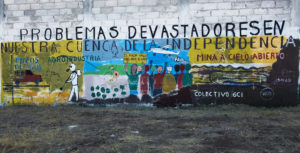 In the Independencia River Basin (state of Guanajuato), local organizations have revealed the impacts caused by export-oriented agribusiness producing for the US market, which are affecting half a million people. As a result of the overexploitation of the aquifer for more than thirty years, the water drawn from it contains fluoride, arsenic, sodium, manganese and other minerals in concentrations that are harmful to human health. The municipalities in this region with the highest concentrations of these elements are also the ones with the highest incidence of chronic kidney disease (CKD), kidney transplants and dental fluorosis. In the corridor between Celaya and León, major industrial accidents have taken place, one of which poisoned as many as 6,000 people. Local organizations in the city of Guanajuato also told the Caravan about the damage to health and the environment caused during the campaigns to combat dengue fever, when people are exposed to pesticides that PAN International classifies as highly hazardous.
In the Independencia River Basin (state of Guanajuato), local organizations have revealed the impacts caused by export-oriented agribusiness producing for the US market, which are affecting half a million people. As a result of the overexploitation of the aquifer for more than thirty years, the water drawn from it contains fluoride, arsenic, sodium, manganese and other minerals in concentrations that are harmful to human health. The municipalities in this region with the highest concentrations of these elements are also the ones with the highest incidence of chronic kidney disease (CKD), kidney transplants and dental fluorosis. In the corridor between Celaya and León, major industrial accidents have taken place, one of which poisoned as many as 6,000 people. Local organizations in the city of Guanajuato also told the Caravan about the damage to health and the environment caused during the campaigns to combat dengue fever, when people are exposed to pesticides that PAN International classifies as highly hazardous.
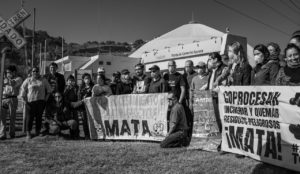 In the Tula River Basin in the south of the Mezquital Valley, the Caravan was able to see the overlapping impacts caused by the core of the national cement industry, extractive industries, industrial parks, a large refinery, a thermoelectric plant, and industrial and urban wastewater dumped into the Salado and Tula Rivers. This water is used downstream for agriculture. The total number of people affected is estimated at one million. The main health problems reported include severe headaches, nausea, vomiting, throat and eye irritation, abdominal pain, breathing difficulties and fainting. Illnesses reported in the area include leukaemia, different kinds of cancer affecting all organs, congenital abnormalities, endocrine disorders, immunological disorders, kidney failure and respiratory diseases. The corporations operating in this region include the Franco-Swiss company LafargeHolcim.
In the Tula River Basin in the south of the Mezquital Valley, the Caravan was able to see the overlapping impacts caused by the core of the national cement industry, extractive industries, industrial parks, a large refinery, a thermoelectric plant, and industrial and urban wastewater dumped into the Salado and Tula Rivers. This water is used downstream for agriculture. The total number of people affected is estimated at one million. The main health problems reported include severe headaches, nausea, vomiting, throat and eye irritation, abdominal pain, breathing difficulties and fainting. Illnesses reported in the area include leukaemia, different kinds of cancer affecting all organs, congenital abnormalities, endocrine disorders, immunological disorders, kidney failure and respiratory diseases. The corporations operating in this region include the Franco-Swiss company LafargeHolcim.
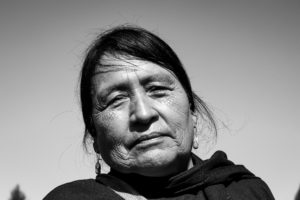 In the Atoyac-Zahuapan basin, where new and old industrial corridors intertwine, 20,400 corporations are operating. In response to the complaints local organizations have filed with the Comisión Nacional de Derechos Humanos (CNDH or National Human Rights Commission) since 2011, it issued a Recommendation (10/2017) which stated that the main causes of pollution were the discharge of untreated municipal and industrial waste into the rivers; improper disposal and collection of solid waste; rapid population growth and uncontrolled industrialization in the region. According to official figures, 26,477 people died of cancer, 4,379 died due to kidney failure, and 906 miscarriages were reported between 2002 and 2016. The mortality rate for cancer in the Atoyac-Zahuapan basin as a whole is 13.5 times higher than the national average. Furthermore, between 2015 and 2019 a person died every two and a half hours from diseases likely to be associated with environmental pollution. The CNDH identified a high incidence of the following conditions in the region: diarrheal diseases, chronic endemic hydroarsenicism (or hydroarseniosis), genetic damage and predisposition to cancer related to exposure to dioxins and furans with genotoxic potential. It also established a correlation between exposure to volatile organic compounds and the presence of myeloid leukaemia. Volkswagen, Bayer and BASF are among the companies that have factories in the region.
In the Atoyac-Zahuapan basin, where new and old industrial corridors intertwine, 20,400 corporations are operating. In response to the complaints local organizations have filed with the Comisión Nacional de Derechos Humanos (CNDH or National Human Rights Commission) since 2011, it issued a Recommendation (10/2017) which stated that the main causes of pollution were the discharge of untreated municipal and industrial waste into the rivers; improper disposal and collection of solid waste; rapid population growth and uncontrolled industrialization in the region. According to official figures, 26,477 people died of cancer, 4,379 died due to kidney failure, and 906 miscarriages were reported between 2002 and 2016. The mortality rate for cancer in the Atoyac-Zahuapan basin as a whole is 13.5 times higher than the national average. Furthermore, between 2015 and 2019 a person died every two and a half hours from diseases likely to be associated with environmental pollution. The CNDH identified a high incidence of the following conditions in the region: diarrheal diseases, chronic endemic hydroarsenicism (or hydroarseniosis), genetic damage and predisposition to cancer related to exposure to dioxins and furans with genotoxic potential. It also established a correlation between exposure to volatile organic compounds and the presence of myeloid leukaemia. Volkswagen, Bayer and BASF are among the companies that have factories in the region.
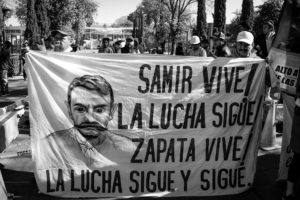 In the Libres Oriental basin, where water is scarce, large industrial pig farms owned by the US-based corporation Granjas Carroll operate alongside Driscoll’s greenhouses growing fruit and vegetables for export, Iberdrola’s solar farms and an Audi car plant, which operates as an extension of the Volkswagen factory in Puebla. These industries consume huge quantities of water from the aquifer, but they also use hail cannons to prevent rain and protect their crops, seriously affecting local small-scale farmers. Pollution associated with industry was also reported in this region.
In the Libres Oriental basin, where water is scarce, large industrial pig farms owned by the US-based corporation Granjas Carroll operate alongside Driscoll’s greenhouses growing fruit and vegetables for export, Iberdrola’s solar farms and an Audi car plant, which operates as an extension of the Volkswagen factory in Puebla. These industries consume huge quantities of water from the aquifer, but they also use hail cannons to prevent rain and protect their crops, seriously affecting local small-scale farmers. Pollution associated with industry was also reported in this region.
 The North of the Isthmus of Tehuantepec, the last region visited by the Caravan, is home to the Uxpanapa Industrial Corridor and one of the oldest and largest chemical and petrochemical industries in Latin America. The organizations of affected communities report air and water pollution caused both by the corporations’ regular operations and when accidents and emergencies occur in the chemical industries. The international observers were also shown evidence of the consequences that open-air coke storage by the Catalan corporation García Munté Energía (GME – ADN Energía) is having on human health and the environment.
The North of the Isthmus of Tehuantepec, the last region visited by the Caravan, is home to the Uxpanapa Industrial Corridor and one of the oldest and largest chemical and petrochemical industries in Latin America. The organizations of affected communities report air and water pollution caused both by the corporations’ regular operations and when accidents and emergencies occur in the chemical industries. The international observers were also shown evidence of the consequences that open-air coke storage by the Catalan corporation García Munté Energía (GME – ADN Energía) is having on human health and the environment.
Even though they are aware of how local people are suffering in these environmental hells, not only have successive Mexican governments at the municipal, state and federal level hitherto failed to act, they have also concealed the environmental, labour and social impacts, ignoring the protests and claims of the people affected. They have also worked to contain social discontent by means of policies to criminalize and repress protest, as well as failing to prevent the terror being sown in community organizations by various criminal groups. Furthermore, they have facilitated the implementation of new industrial and infrastructure megaprojects that only increase the risks to local people.
It is also important to mention the governments of European countries and the United States, where many of the transnational corporations operating in Mexico’s industrial paradises have their headquarters. These governments provide public support and funding for the international operations of these transnationals in the form of insurance, credit and technical assistance, with no control or guarantee that environmental and human rights standards will be respected. Neither do they accept any responsibility for the social and environmental conflicts that arise. Instead, they pressure other countries to sign free trade and investment protection agreements. A case in point is the renegotiation of the agreement between the European Union and Mexico, thanks to which Mexico is set to be the first Latin American country to sign an investment protection agreement with the European Union as a whole. If this agreement is approved, it will ring-fence the corporations’ power still further and could hamper the implementation of policies committed to human rights in Mexico. See below the arbitration cases already filed against Mexico.
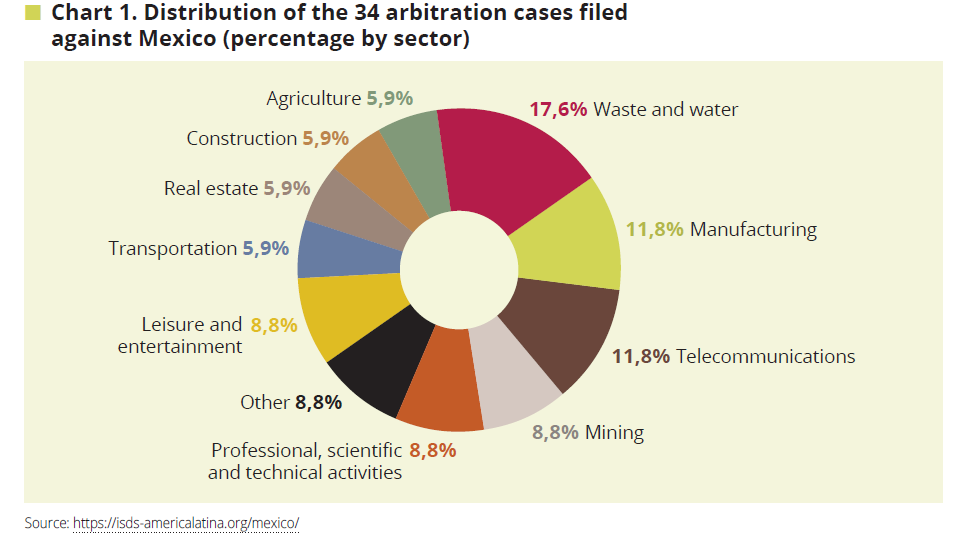
One of the things that the Caravan’s international observers found most striking is the capacity to resist and organize protest developed by the affected communities in the six regions they visited. It was clear that despite the destruction of their territories and the constant attacks on their lives and health they have endured for decades, they have been able to monitor the impacts, developed a significant capacity to conduct collective analysis, and forged links with a few committed scientists who have provided backing for the community’s assessments. In the midst of the COVID-19 pandemic in 2020, and taking advantage of the visibility they had achieved, partly thanks to the Caravan, these organizations kept up the pressure on the Mexican government. And in 2021 they achieved a historic step forward, which could set a precedent for other regions both in Mexico and around the world. They have obtained a commitment from top-level authorities in the ministries of the environment and health and the Consejo Nacional de Ciencia y Tecnología (CONACYT or the National Council of Science and Technology) to work with them under a Coordination Framework Agreement. This will lead to action being taken on what have been declared Environmental and Health Emergency Regions, under the Programas Nacionales Estratégicos de Agentes Tóxicos y Procesos Contaminantes (PRONACEs or National Strategic Programmes on Toxins and Pollution) that focus on health and water. Government compliance with its commitments here is as urgent as it is necessary, and must be monitored by civil society in Mexico and internationally.
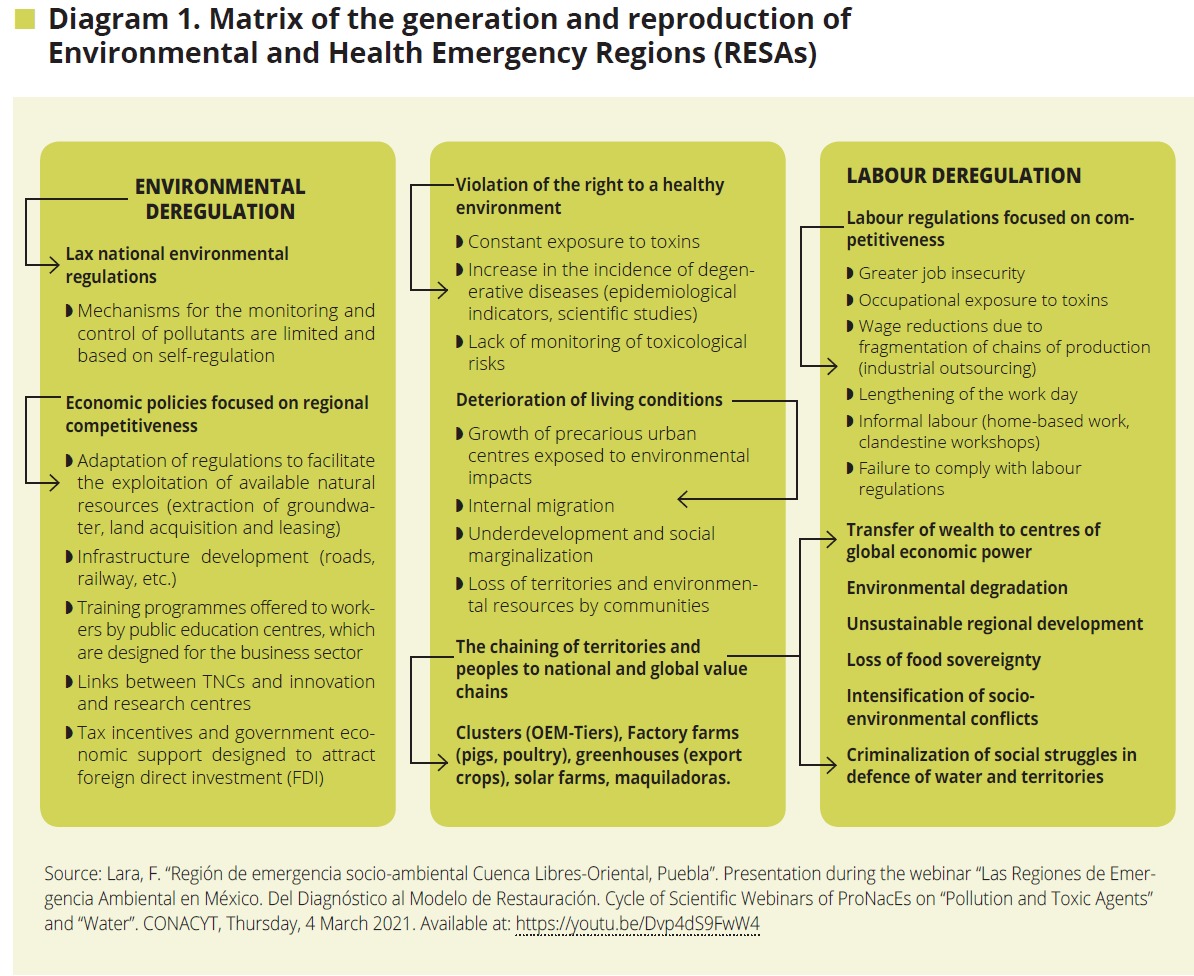
The recommendations addressed to policy makers include the Mexican but also the US and European governments and parliaments, as US and European transnational corporations (TNCs) were present in practically all the environmental hells the Caravan visited. The report counted, among others, with contributions of the Mexican organisations of affected peoples, international observers, members of the Global Campaign to Reclaim Peoples Sovereignty, Dismantle Corporate Power and Stop Impunity, as well as the European Network on Corporate Observatories (ENCO), and other independent researchers. It gives new evidences on the urgent need for binding regulations, in particular in the process of negotiation of the UN Binding Treaty on transnational corporations (TNCs) with respect to human rights.
The report is also a tool for the civil society mobilisation on the Trade and Investment front. For instance, the renegotiation of the free trade agreement between the European Union and Mexico will strengthen corporate power still further and could hamper the implementation of policies committed to human rights in Mexico.
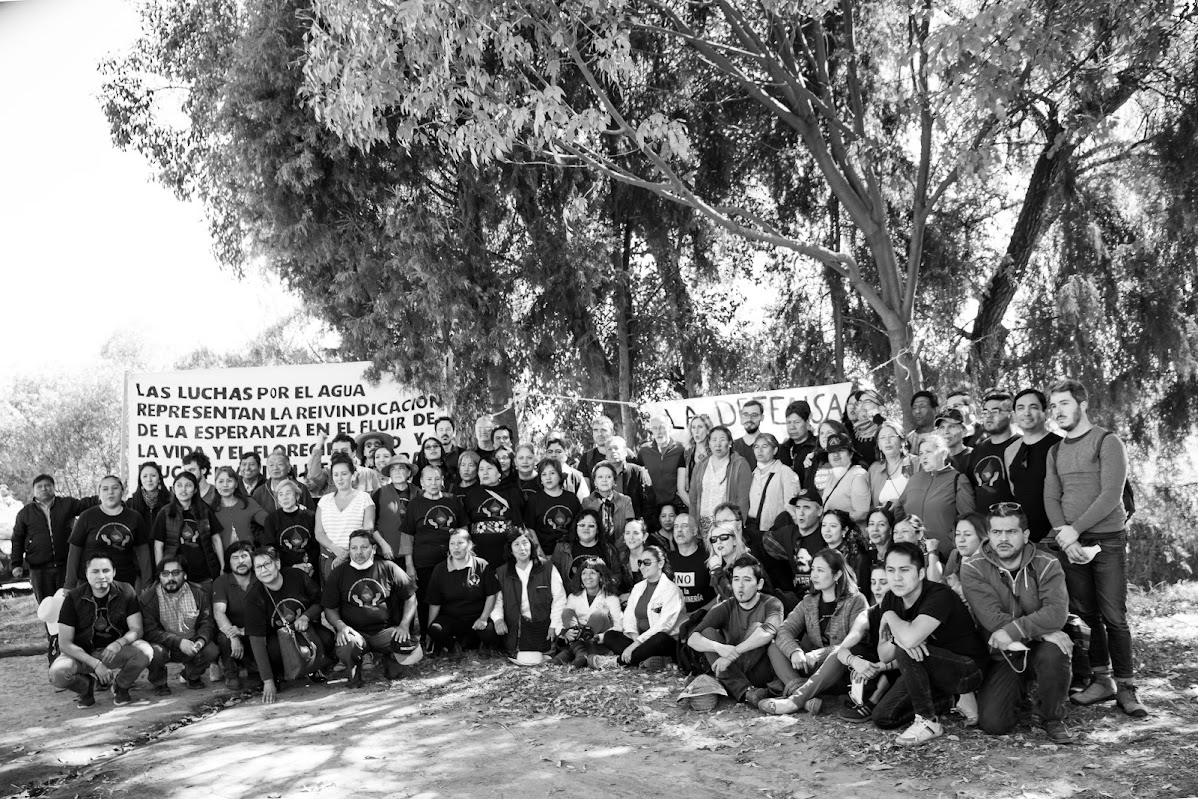 With special thanks to Andrés Barreda, Primavera Téllez and the organising team in Mexico for making the Caravan #ToxiTourMexico possible, as well as to the affected communities, that resist and build alternatives to corporate power.
With special thanks to Andrés Barreda, Primavera Téllez and the organising team in Mexico for making the Caravan #ToxiTourMexico possible, as well as to the affected communities, that resist and build alternatives to corporate power.
Letter sent by 12 MEPs to the European Commission with the Recommendations of the Report (2 pages)
Download the Full report (106 pages)
Download the Executive Summary including recommendations (10 pages)
Coordinator: Mónica Vargas, Corporate Power Team (TNI)
Contributors: Martín Álvarez-Mullaly, Iñaki Barcena, Lucía Bárcena, Lucía Benavides, Lorenzo Bozada, Cristina Caldera, Alan Carmona, Refugio Choreño, Peter Clausing, Thomas Dürmeier, Sofía Enciso, Graciela González, Ralf Häußler, Julisa Hernández, Fabiola Lara, Martin Mantxo, Julia Martí, Cindy McCulligh, Alejandra Méndez Serrano, Laura Méndez Rivas, Rocío Montaño, Bettina Müller, Cecilia Olivet, Mercedes Páramo, Mayra Peña Contreras, Manuel Pérez Rocha, Olivier Petitjean, Federico Pohls Fuentevilla, Alejandra Ramírez Varela, Patricia Rendón, Giovanna Segura, Sabrina Spitznagel, Mónica Vargas, Oswaldo Villegas, the teams from Taula per Mèxic and Multiwatch, and the offices of MEP Leïla Chaibi and Senator Patricia Torres Ray (Minnesota, USA).
October 2021
English translation: Karen Lang and Sara Shields
Design: Toni Sánchez Poy
Photographs: Martín Álvarez-Mullally and Colectivo Guardianes de la Cuenca Independencia
Published by:
Acción Ecológica
EHBildu
Ekologistak Martxan
ENCO
Goliathwatch
México vía Berlín
Multiwatch
Oficina Ecuménica por la Paz y la Justicia
Observatoire des Multinationales
Observatorio Petrolero del Sur
Taula per Mèxic
The Left in the European Parliament
TRADENER
Transnational Institute
Unión de Afectado/as por Chevron Texaco
ZEB – Zentrum für Entwicklungsbezogene Bildung
With contributions from Corporate Accountability
- Agua, Tierra y Aire Limpio para nuestros pueblos: El Salto, Juanacatlán, Puente Grande, Tololotlán and Los Laureles
- Asamblea Nacional de Afectados Ambientales (ANAA)
- Alianza Hidalguense Ambiental
- Amando la Naturaleza A.C.
- APETAC
- Asamblea Maseual Autónoma del Agua
- Caminando por la Justicia, Atitalaquia Hidalgo
- Centro de Desarrollo Agropecuario A.C. (CEDESA)
- Centro Fray Julián Garcés Derechos Humanos y Desarrollo Local A.C.
- Chogosteros en acción. A.C. Municipality of Jáltipan de Morelos Veracruz
- Coalición en Defensa de la Cuenca de la Independencia (CODECIN)
- Coalición de Organizaciones Democráticas Urbanas y Campesinas (CODUC)
- Colectivo Altepee
- Colectivo Hermanos Serdán
- Comité Agua y Vida, Santa Cruz de las Flores, Tlajomulco de Zuñiga
- Comunidad de Huaxtla
- Comunidad de San Lorenzo
- Comunidad indígena coca de Mezcala y San Pedro Itzicán
- Consejo Regional de Pueblos Originarios en Defensa del Territorio de Puebla e Hidalgo
- Coordinadora Nacional Plan de Ayala Movimiento Nacional (CNPAMN)
- Coordinadora por un Atoyac con Vida
- Coordinadora de los Pueblos en Defensa del Río Atoyac
- EcoTuzuapan. San José Tuzuapan, Quecholac, Puebla
- Fundación para el Desarrollo Integral Apaztle. Municipality of Apaxco, State of México
- Frente de Comunidades contra la Incineración
- Grupo Nuestras Aguas, Casa Blanca, Poncitlán
- Laboratorio de Investigación en Desarrollo Comunitario y Sustentabilidad (Lidecs)
- Observatorio Ambiental Ciudadano Biósfera
- Omniunity A. C.
- Organización Kinti Soluciones Sostenibles
- Movimiento de Autogestión Social Campesino Indígena Popular (MASCIP CNPAMN)
- Movimiento Independiente Obrero Campesino Urbano Popular (MIOCUP CNPAMN)
- Movimiento para la Defensa del Agua y de la Tierra (MODAT CNPAMN)
- Museo Comunitario Atotonilli
- Pueblos de la Barranca del río Santiago. Azqueltlán Amacueca
- Pueblos Unidos Contra la Privatización del Agua
- Radio Xalli
- Red Alebrije
- Educación Colaborativa
- Red Conciencia Ambiental “Queremos Vivir” A.C.
- Resistencia Civil Pacífica
- Unión de Ecologistas San Jerónimo Tlamaco
- Unión Popular de Vendedores Ambulantes 28 de Octubre
- Un Salto de Vida A.C.
- Unión de Científicos Comprometidos con la Sociedad (UCSS)
- Unión de Trabajadores de Desechos Sólidos Industrializables, Lázaro Cárdenas del Río del Estado de Guanajuato A.C.
- Yo Prefiero El Río Tula
